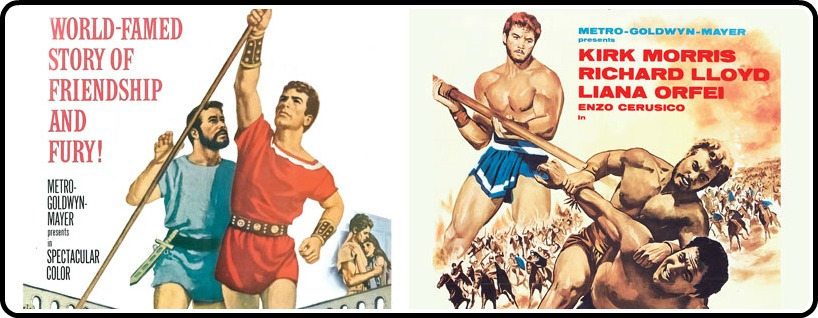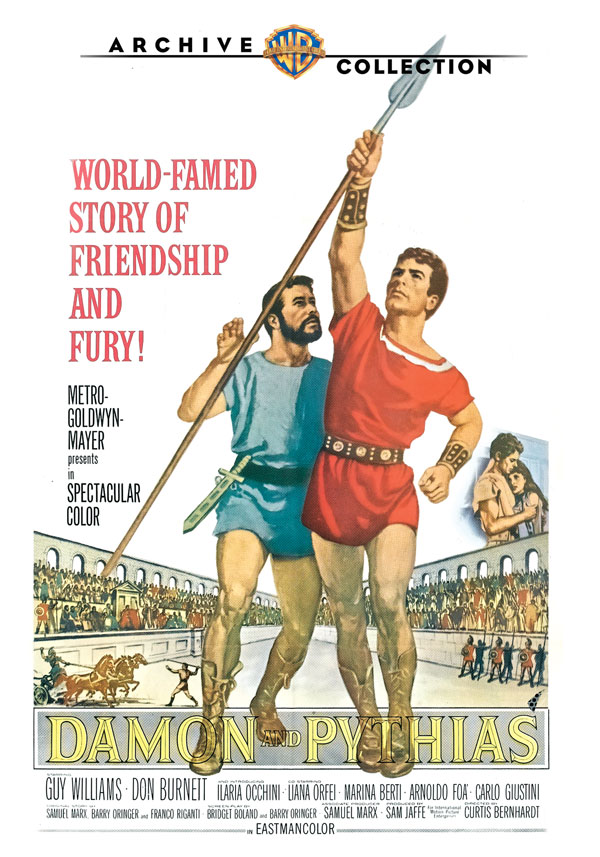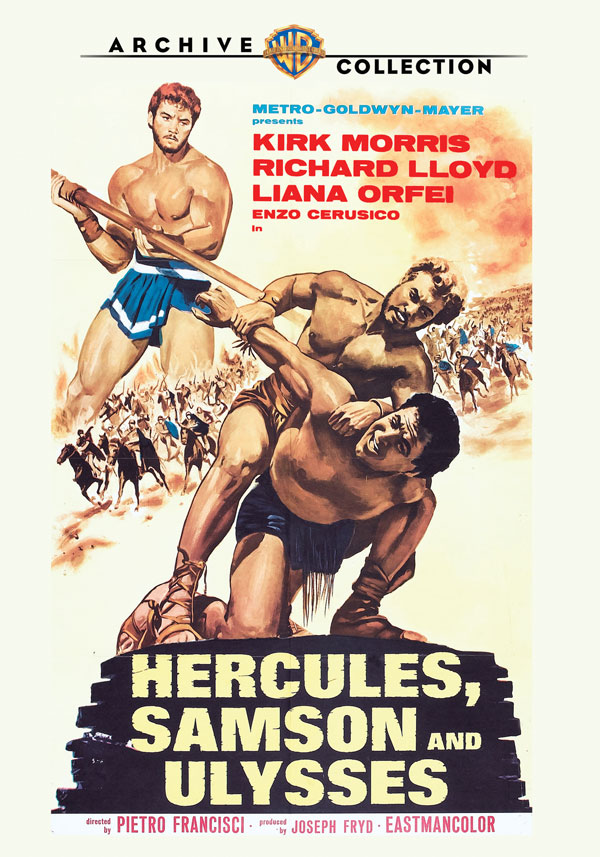And then there was the time Hollywood went to Italy.
For a few years between the late 1950’s and the mid-1960’s, dozens of sword-and-sandal epics were churned out on the cheap, featuring bad Italian actors speaking dialogue that would later be dubbed by even worse American actors, using materials left over from more expensive American productions like Quo Vadis (1951) and Ben-Hur (1959). These pictures were snatched up and brought to our shores, where they filled out many a double feature before making way for the superior Spaghetti Western. The Warner Archive has made a couple of these films available on “manufactured on demand” DVDs.
1962’s Damon And Pythias is the more polished of the two, and the one that stars a couple of American actors amidst all the dubbed Italian ones. Guy Williams (who played Zorro on TV before this picture, and returned to TV afterward to star in Lost In Space) plays Damon, a larcenous rascal who befriends Pythias (Don Burnett), a more noble fellow on a mission that pits him against the cruel villain Dionysus. Damon and Pythias become prototypical buddies, starting out on the wrong foot but eventually forging a fraternal bond faster than you can say Riggs and Murtaugh. The earnest screenplay fleshes out the classic Greek story of the dynamic duo, throwing in Pythias’ pregnant wife Nerissa (Ilaria Occhini) and a girlfriend for Damon (Liana Orfei), and an annoying musician who is apparently the Jimmy Page of the double flute. Guy Williams makes a pretty good hero as Damon, and is way more charismatic and entertaining than this film deserves. Don Burnett, on the other hand, is about as blandly affable as the stockbroker he would eventually become after he’d had enough of the movie racket. Miss Occhini is overwrought as Pythias’ long-suffering spouse, while Miss Orfei is similarly overwrought but makes up for it with sex appeal; Arnoldo Foa makes a sly and sinister bad guy as Dionysus The Tyrant, so much so that his capitulation in the film’s climax seems wildly out of character. Damon And Pythias was the penultimate directorial effort from Curtis Bernhardt, and as these things go, he does a decent if unremarkable job. (Perhaps he should have quit while he was ahead — his last picture, 1964’s Kisses For My President with Fred MacMurray as the husband of America’s first female commander-in-chief, was an ill-conceived gender-based comedy that did neither sex any favors.) It’s not a lot of fun, but Guy Williams saves the film from sinking under the weight of its more pedestrian tendencies.
If it’s fun you’re looking for, Hercules, Samson and Ulysses (1964) will be more to your liking, because big stupid fun is the name of the game in this picture. Bringing together three legendary characters to form some kind of supergroup — sort of like a mythical Traveling Wilburys — the movie starts at ridiculous and escalates from there. Sadly, there’s no Steve Reeves playing Hercules here, so we have to make do with Italian bodybuilder Kirk Morris (not his real name), lifting heavy things and hurling large objects hither and yon accompanied by dopey sound effects. From the start, when he takes to the ocean to do battle with a sea monster (accompanied by scrawny Italian non-bodybuilder Enzo Cerusico as Ulysses), it’s obvious that we’re in Mystery Science Theater 3000 territory — a lookout cries sea monster, and we are then treated to a shot of… a sea lion. At first, I was absolutely convinced that Hercules would run to the edge of the boat, take one look at the sea lion, and say “You dope! Why, that’s nothing but a harmless sea lion!” and we’d all have a big laugh at this false alarm until the actual sea monster showed up. Nope. Everybody treated the sea lion as though it were as imposing and dangerous as Monstro The Whale. After their boat sinks and they make their way to shore (where Hercules kills an ox by punching it in the head… you heard me), our intrepid chowderheads find themselves in Judea or someplace, where Hercules runs afoul of the Philistines due to a case of mistaken identity — they think he’s Samson, the mighty strongman on whose fat head the Philistines have put a hefty price tag.
The Hercules party is captured, and our man Herc is forced to track down Samson and bring him back alive in order to save his pals. This naturally leads to a wild showdown between Herc and Samson, played by another bodybuilder acting under the name Richard Lloyd. (Although it’s a lot of fun to imagine that this Richard Lloyd is the same one who played guitar in the seminal 70’s New York art-punk band Television, an extraordinarily miniscule amount of research proves that they are not the same dude.) Samson can also throw big things with stupid sound effects, and so the fight is a gas (laughing gas, that is) as our two musclemen beat the crap out of each other, knocking down conveniently-placed stone walls and columns all the while, until they set aside their differences to join forces and get their fill of Philistine ass-kicking. Hercules, Samson And Ulysses is slopping over with problems — for starters, why not just call it Hercules And Samson since Ulysses is little more than a sidekick who doesn’t even have his own goofy sound effects? — but it’s wonderfully entertaining in a low-expectations kind of way. The two big oafs do more or less what is required of them (except for speaking with their own voices), while Damon And Pythias’ Liana Orfei is back as Delilah, queen of the Philistines and a treacherous vixen who poses and pouts in a petulant frenzy as her double-crossing schemes come to naught. Also on hand is Aldo Giuffre (perhaps best known in America as the drunken Union Captain in Sergio Leone’s The Good, The Bad And The Ugly), chewing all the scenery in sight as Seren, the Philistine king. Under the direction of Pietro Francisci, the film builds to a rousing climax that is hampered only by the shoddy filmmaking and cheesy production values; along with the poor dubbing, there are also several inexplicable cuts in the film as though some scenes were chosen at random for shortening. But its silliness is what makes the picture fun to watch. Hercules, Samson And Ulysses will never wind up on anyone’s list of timeless classics, but as light entertainment goes, you could do worse.





